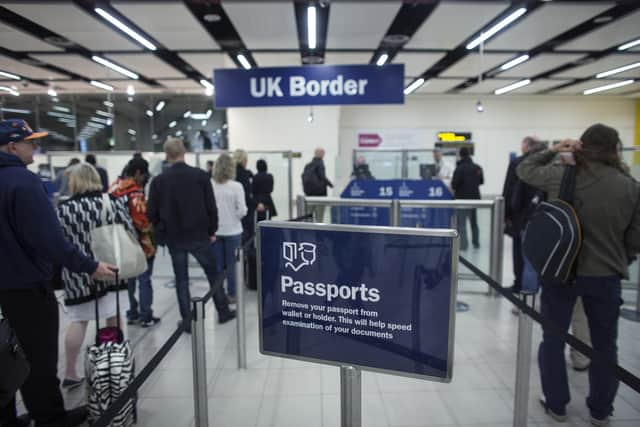Brexit visa changes to block low-skilled EU migrants from entering UK
The UK government will effectively close the door on “low-skilled” immigration from the EU by ending free movement and not issuing visas to migrants who lack qualifications or a job offer in a “high-skilled” profession.
Ministers said the government is delivering on a promise to reduce net migration with a policy that would encourage employers to provide better training and incentives to local and existing workers.
Advertisement
Hide AdAdvertisement
Hide AdBut the SNP condemned what it said was a “disastrous one-size-fits-all policy” that would damage the Scottish economy, while the Liberal Democrats claimed the changes were driven by “xenophobia”.


Under the new scheme, which is set to be introduced from 1 January, 2021, immigrants from the EU and the rest of the world will have to hold a job offer from an approved sponsor at an “appropriate skill level”, and demonstrate that they can speak English adequately – basic requirements that will give them 50 out of the necessary 70 points.
Point system
The existing £30,000 earnings threshold for non-EU migrants will be lowered to £26,500, with those earning above that level securing the final 20 points they need.
Immigrants earning less than £26,500 will still be able to come to the UK if they have a job on the approved “shortage occupation list”, which includes chefs, nurses and engineers – as well as teachers in Scotland.
Holding a PhD, particularly in science, technology, engineering or mathematics, will also count towards the 70-point threshold to secure a visa.
A pilot scheme will recruit 10,000 seasonal agricultural workers, although the food industry has warned it will need much more labour. Existing youth mobility programmes will also allow 20,000 young workers to come to the UK.
And immigrants with jobs will continue to be able to bring dependent family members with them – but only if they have savings of nearly £25,000 for a partner and two children.
“We’re ending free movement, taking back control of our borders and delivering on the people’s priorities by introducing a new UK points-based immigration system, which will bring overall migration numbers down,” Home Secretary Priti Patel said.
Advertisement
Hide AdAdvertisement
Hide Ad“We will attract the brightest and the best from around the globe, boosting the economy and our communities, and unleash this country’s full potential.”
There was a warning from business that the new system would leave companies struggling to recruit the staff they need.
Visa cap
“Several aspects of the new system will be welcomed by business, particularly abolishing the cap on skilled visas, introducing a new post-study work visa for overseas students, and reducing the minimum salary threshold from £30,000,” said Carolyn Fairbairn, the director general of the Confederation of British Industry.
“Nonetheless, in some sectors firms will be left wondering how they will recruit the people needed to run their businesses. With already low unemployment, firms in care, construction, hospitality, food and drink could be most affected.
“Firms know that hiring from overseas and investing in the skills of their workforce and new technologies is not an ‘either or’ choice.”
UK ministers have rejected repeated demands for powers over immigration to be devolved, to allow the Scottish Government to develop its own policies to tackle Scotland’s particular challenge with an ageing population and struggling rural services.
A plan for a “Scottish visa” proposed by Nicola Sturgeon earlier this year was dismissed within hours by Downing Street.
‘Bad for business’
The SNP’s immigration spokesman at Westminster, Stuart McDonald, claimed free movement was “about the only bit of the UK migration system that works well” and scrapping it would be “bad for business and bad for the economy”.
Advertisement
Hide AdAdvertisement
Hide Ad“The Tories have had 42 months to develop proposals for a new migration system and they’ve come up with a half-finished and disastrous one-size-fits-no-one policy that poses a very real threat to Scotland and leaves businesses and the public with just 10 months to prepare for it,” Mr McDonald said.
“Boris Johnson’s crackdown on so-called low-skilled migration will devastate sectors such as hospitality, social care, agriculture and scientific research – many key industries across Scotland will no longer have access to vital workers we desperately need.”
He added: “The total absence of any reference to Scotland, to remote areas, or the self-employed is extraordinary.
“And while the paper is almost silent on families, we know that many thousands more couples will be split apart and parents separated from their kids.”
But Scotland Office minister Douglas Ross insisted the new system would “work for Scotland and the whole of the UK”.
“It will support our renowned universities and world-beating high-tech sector,” Mr Ross said “It avoids putting up barriers to business by splitting our UK-wide system and it ensures our whole economy can continue to grow.”
Labour’s shadow home secretary Diane Abbott said: “This isn’t an ‘Australian points-based system’, which is a meaningless government soundbite. It’s a salary threshold system, which will need to have so many exemptions, for the NHS, for social care and many parts of the private sector, that it will be meaningless.
“If families are split up because spouses and children are denied entry, this will be terrible for them and will deter many of the workers we need.”